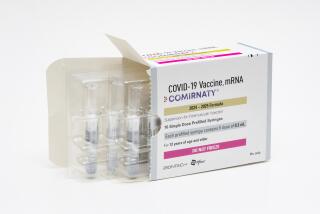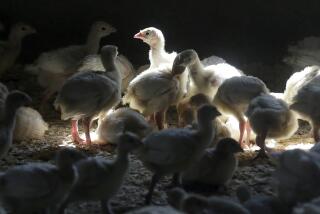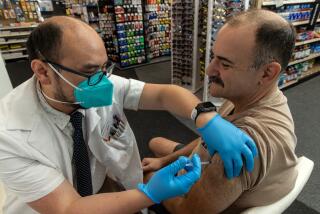H1N1 vaccines are doing well in trials, U.S. officials say
- Share via
Preliminary data from U.S. trials of vaccines against the pandemic H1N1 influenza virus confirm that a strong immune reaction is provoked by just one dose of the vaccine within eight to 10 days after it is administered, federal officials said at a news conference Friday morning.
The findings “corroborate and reinforce data from company trials” that were reported earlier this week, said Dr. Anthony S. Fauci, director of the National Institute of Allergy and Infectious Diseases, which is running the trials.
The results are “very positive news” and mean Americans “will be protected sooner than we thought,” said Health and Human Services Secretary Kathleen Sebelius, also at the news conference.
Ever since the virus, commonly known as swine flu, was first identified in April, researchers had expected that two doses of vaccine would be necessary for full protection. With the seasonal-flu vaccination effort already underway, a proposed recommendation of three flu shots per person had created the likelihood of an extensive vaccination campaign for Americans -- and a logistical nightmare for public health officials.
The finding that only one dose will be required for protection against the pandemic H1N1 virus also means that more vaccine will be available both in this country and around the world, Sebelius said.
There have been “no significant adverse events whatsoever” in any of the trials, Fauci said. “We’re seeing the kinds of things you would expect, swelling and redness at the injection site that is not clinically significant. There are no red flags on safety in any of these trials.”
No results are available yet from the trials on children and pregnant women. Those studies started later than the others and results will not be available for a couple of weeks.
The National Institute of Allergy and Infectious Diseases has clinical trials of two vaccines ongoing in more than 2,800 people. The first began Aug. 7.
In a trial of the vaccine produced by France’s Sanofi Pasteur, researchers found that a single 15-microgram dose of the viral antigen -- the same dosage in seasonal vaccines -- produced robust immunity in 96% of healthy adults ages 18 to 64 and in 56% of those ages 65 and older within 10 days.
Similarly, trials of a virtually identical vaccine produced by Australia’s CSL Ltd. produced strong immunity in 80% of those between ages 1 and 64 and in 60% of those ages 65 and older.
Preliminary results from an Australian trial of the CSL vaccine conducted by the company and reported Thursday showed 95% protection against the virus. Fauci said the slight discrepancies between the two trials were not a concern, because of technical difficulties in the measurement of the precise amount of antigen in the vaccines.
The lower protection among the elderly “was not unexpected,” he added. “That is the case with seasonal flu vaccines as well.”
The swine flu vaccine is expected to become available by the middle of October, although MedImmune Corp. said Thursday that it would begin distributing its inhalable FluMist vaccine by the end of September. That vaccine is not approved for pregnant women or people with underlying health problems.
But Sebelius noted that the seasonal flu vaccine is available now and that people should get it as soon as possible; she said she had received her own shot Friday morning.
Dr. Anne Schuchat, director of the National Center for Immunization and Respiratory Diseases at the Centers for Disease Control and Prevention, said that 38 million doses of seasonal flu vaccine have already been distributed and that a total of 115 million doses should be available.
The CDC has ordered the ingredients for 195 million doses of H1N1 flu vaccine. The high-priority groups for the vaccine total 159 million people, so vaccine should be available for everyone.
Schuchat said that the fall flu season has already started and that 98% of the cases observed so far are swine flu. The virus is being seen in every state but is widespread in 11 states, primarily in the Southeast, where school started earlier than in the rest of the country.
Such a high level of activity this early in the season is “extremely unusual,” she said.
Since the current pandemic began 34 weeks ago, there have been 9,079 U.S. hospitalizations associated with laboratory-confirmed cases of swine flu and 593 deaths, according to the CDC.
The fact that the swine flu virus is the primary virus circulating now is no reason not to get immunized against seasonal flu, Fauci said.
“Ideally, you would hope that you would get vaccinated before the virus starts circulating,” he said.
--
More to Read
Sign up for Essential California
The most important California stories and recommendations in your inbox every morning.
You may occasionally receive promotional content from the Los Angeles Times.













